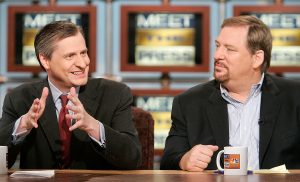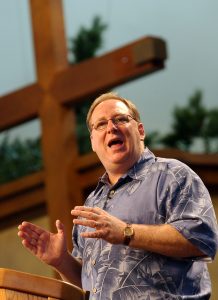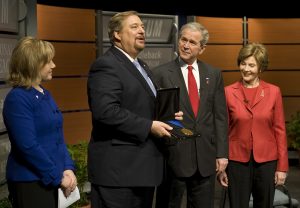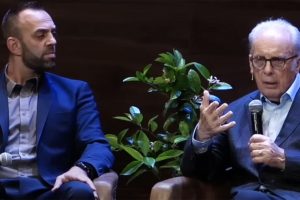Rick Warren thought he was going to be late for our appointment, but with good reason.
The best-known pastor in America had been to the grocery store. He knows most of the workers there by name, but this checker was someone he had not met before. She was having a very bad day.

Newsweek Magazine Editor Jon Meacham (L) speaks as Pastor Rick Warren (R), author of “The Purpose Driven Life,” looks on during a taping of “Meet the Press” at the NBC studios December 15, 2006, in Washington, D.C. (Photo by Alex Wong/Getty Images for Meet the Press)
While he waited in line with his groceries, she talked passionately on the phone, explaining her distress at not being able to find her car keys. No groceries were getting scanned or bagged, but profane language was flying.
Warren decided not to raise a protest and make the clerk’s already bad day worse. When she ended the call, he commented on how frustrating it is to lose things. He’s been there before. Yes, she said, she has looked everywhere for her keys and can’t find them. She doesn’t know what else to do.
“Would you like me to help you look for your keys?” he asked.
“You would do that?” she replied in amazement.
She called for backup at the register, and the two of them walked (with his bagged groceries) to the parking lot where together they dug through every nook and cranny looking for the lost treasure to no avail. Finally, he suggested she try to start the car — it is a key fob model that will start if the keys are anywhere in the car — and it miraculously started. That meant the keys were somewhere in the car.
They started searching anew and in time, Warren found the keys stuck in a remote place they had overlooked before.
“Do you know who this is who’s helping you?”
About this time, the woman’s sister appeared, assessed the situation and said to the clerk: “Do you know who this is who’s helping you?”
“No,” the thankful woman replied.
“That’s Rick Warren,” the sister said.
Still no comprehension.
“He’s a pastor. He started Saddleback Church. And he saved our marriage.”
“You should come to church on Sunday,” Warren urged.
“I think I will,” the clerk replied.
Sitting in the office of the foundations run by Warren and his wife, Kay, less than an hour later, Warren tells this story to illustrate his view of evangelism. The best evangelism is relational and begins by meeting peoples’ needs, he said. “Nobody wants to be sold a product. And nobody wants to be asked to sell to their friends.”
But just imagine the ripple effect that could reverberate from one act of genuine kindness, he said. Who knows what will happen if one grocery store clerk comes to church, finds faith and shares that faith with others?
Obsessed with the Great Commission
Rick Warren is obsessed with the Great Commission — the final command of Jesus to go into all the world and preach the gospel, baptize believers and make disciples. His Great Commission passion and his belief that both women and men are equally called to the task recently got Saddleback Church kicked out of the Southern Baptist Convention.
SBC leaders are so obsessed with keeping women from preaching and serving as pastors that they were willing to lose the convention’s largest church.
SBC leaders are so obsessed with keeping women from preaching and serving as pastors that they were willing to lose the convention’s largest church, the church that has baptized more members than some state Baptist conventions and the church that has replicated itself through more church starts than any other church in modern history.

Rick Warren addresses messengers to the 2023 SBC annual meeting in New Orleans.
But Warren is not deterred. He’s taking a long view and is certain the SBC’s narrow view will lose over time. Maybe not in his lifetime, but in time.
Fulfilling the Great Commission requires no players left on the bench, every person engaged, he believes. And besides, the very first people given news of the resurrection of Jesus were women.
Warren’s brain works like a card catalog of Scripture, history and facts. He speaks in the sort of helpful lists contemporary pastors employ in sermons. He cites three reasons this is true and five types of this thing. He names four uses of this word in the Greek New Testament and only one of that.
How to interpret?
With that mental precision, he makes the case once again for why his former family of faith — the denomination that raised him and educated him, that supported him as a young church planter — has interpreted the Bible wrongly.
Christian fundamentalists love to quote 1 Timothy 2:12, where the Apostle Paul is translated as saying, “I do not permit a woman to teach or to assume authority over a man; she must be quiet.”
First, Warren says, the Greek word authenteō — translated to English as “assume authority” — is a word not so easily translated. That’s because it’s what scholars call a hapax legomenon, meaning a word used only once in the entire New Testament. No similar usages exist for comparison or context, and the word’s usage in classical Greek only adds more confusion to the discussion.
No Christian should build an entire theology out of a hapax legomenon, Warren insists.
If Paul wants women to “be quiet” in worship, Warren reasons, that means they shouldn’t utter a word at all.
Second, there are common sense reasons this passage likely doesn’t mean what fundamentalists say it does: If Paul wants women to “be quiet” in worship, Warren reasons, that means they shouldn’t utter a word at all. They shouldn’t greet anyone, utter a prayer or even sing a hymn.
Third, there are nine commands given in this section of 1 Timothy, Warren notes, and fundamentalists cherry-pick the ones they want to be essential for all time. You’ve either got to take them all as essential or none of them as essential, he insists.
In the same passage, the apostle says men must “lift” their hands in prayer, that women must dress “modestly” and not come to worship with “braided hair” or gold or pearls or “costly clothing.”
No help from the SBC
These are among the arguments Warren wanted to make to messengers at this year’s SBC annual meeting in New Orleans, where he was given only 3 minutes to defend his church against disfellowshipping. He was not allowed to purchase advertising space in the tote bags given out to messengers — even though all manner of other businesses may do so. That decision was made by a vice president of the SBC Executive Committee.
Instead, he created a website to explain his position and Saddleback’s position. He also created a Bible study on the passages most often used to limit women in church leadership, but he couldn’t give that to convention messengers either.
The die was cast against Warren and Saddleback.
The die was cast against Warren and Saddleback. While the year before when the annual meeting was held in Anaheim, Calif. — in the same county as Saddleback’s main campus — Warren received a standing ovation for his defense of local church autonomy, in New Orleans, there were no ovations, only overwhelming rejection.

Rick Warren in 2003. (Photo by Bob Riha, Jr./Getty Images)
“I didn’t expect us to win,” he has said repeatedly since the vote. “I didn’t do this for us but for the thousands of other churches that cannot risk taking a public stand.”
This isn’t the first time Warren has taken on a Goliath for the sake of others. In 2001 and 2002, he took on the IRS, which claimed he had misused the so-called clergy housing allowance. Because he was a high-profile pastor, critics of the tax break sought to make a negative example of him.
Ultimately, he pulled off an act of Congress to protect other pastors who depend on that tax break to survive on the often-meager wages paid by smaller churches. The Clergy Housing Allowance Clarification Act passed both houses of Congress in record time and with no dissent.
People underestimate Warren at their own risk.
A charismatic ambassador
The story of how he and Kay arrived in Orange County in 1980 with no money and no church members is the stuff of church planting lore. Warren has written about walking into a real estate agent’s office looking for a place to live — again, with no money and no income. Miraculously, they walked out of the office with keys to a condo with no money down and the first month’s rent free.
More importantly, that real estate agent became an original member of Saddleback Church and is still there today, 43 years later, and teaches youth. He’s one of more than 40 founding members still alive and active in the church.
Warren has a natural charisma and larger-than-life personality. His voice is loud, his smile is big, his embrace sincere. He loves people.
Warren has a natural charisma and larger-than-life personality.
Which is another reason the SBC’s rejection is so odd. For the sake of keeping women from preaching and leading as pastors, the SBC rejected its best-known ambassador. Not only that, among other congregations leaving or pondering leaving the SBC now, many have pastors who were mentored by Rick Warren.
The second-largest SBC congregation to announce its departure is Elevation Church in Charlotte, N.C., led by Pastor Steve Furtick. “I trained him,” Warren said nonchalantly.
It’s unlikely Saddleback will be kicked out of its local Baptist association because more than one-third of the churches in the association were started by Saddleback. In Southern Orange County, one in nine residents is on the roll at Saddleback.

Presumptive Republican Presidential candidate U.S. Sen. John McCain (R-AZ), Pastor Rick Warren and Presumptive Democratic Presidential candidate U.S. Sen. Barack Obama (D-IL) greet the crowd before the start of the Civil Forum on the Presidency at the Saddleback Church August 16, 2008. (Photo by Justin Sullivan/Getty Images)
Worldwide influence
Warren is so well known there — except for some grocery clerks, apparently — that he and Kay can’t host out-of-town dignitaries at local restaurants. So at their foundation headquarters, they built what Warren calls a “state dining room.” It’s a huge room adjacent to a full kitchen. A long wooden table in the California Mission style of the building seats about 20 people.

Rick Warren prays at the swearing in ceremony for Rwandan President Paul Kagame in 2010.
U.S. officials and foreign dignitaries alike have dined here.
One of the best-kept secrets about Warren’s life and ministry is the number of heads of state and other world leaders who seek his counsel and come to California to visit. Not to mention the number of trips Warren has made to preach, serve and counsel in 165 countries.
Prime ministers and presidents have his phone number.
Warren has been a broker in peace deals and a counselor to world leaders in moments of crisis.
Evidence of those relationships is on display in his private library, which holds 150,000 volumes and a museum of artifacts and mementoes he’s collected through the decades. The collection ranges from the ’60s-era buckskin suede fringe jacket he wore as a teenage evangelist in Northern California to original letters from the likes of Mother Teresa and historical letters from the likes of Abraham Lincoln.

U.S. President George W. Bush receives the International Medal of PEACE from Rick Warren as First Lady Laura Bush and Kay Warren look on during the Saddleback Civil Forum on Global Health at the Newseum December 1, 2008, in Washington, D.C. (Photo by Mannie Garcia-Pool/Getty Images)
He has correspondence and mementoes from U.S. presidents of both parties. Warren describes himself as a political independent. He prayed at the inauguration of Barack Obama and has worked with both George H.W. Bush and George W. Bush.
He’s also deeply committed to racial justice and social justice and has been active in advocating for a variety of issues.
Warren’s historical sense of humor shows up in the placement of two small statues that sit on facing endcaps of library shelves. John Calvin and John Wesley are predestined to have to see each other forever.
One of his most prized possessions in the collection is a fedora Warren wore to Obama’s inauguration. That hat was sent to him from Billy Graham, who had worn it 11 times to presidential inaugurations. The famed evangelist sent it with a note passing the mantle.
Graham became a mentor to Warren when the California preacher was a youth evangelist.
Early on, Warren also received a blessing from W.A. Criswell, legendary pastor of First Baptist Church of Dallas.

Singer/songwriter Elton John and Rick Warren shake hands prior to a hearing before the State, Foreign Operations and Related Programs Subcommittee of the Senate Appropriations Committee May 6, 2015. The subcommittee held the hearing on global health problems. (Photo by Alex Wong/Getty Images)
Warren, a 19-year-old student at California Baptist College, and his best friend skipped classes and drove from Los Angeles to San Francisco to hear Criswell preach. In a reception line afterward, Warren shook hands with Criswell and introduced himself.
Criswell looked at him and said, “Young man, I feel led to lay hands on you and pray for you!” Then he prayed: “Father, I ask that you give this young preacher a double portion of your Spirit. May the church he pastors grow to twice the size of the Dallas church. Bless him greatly, O Lord.”
That was years before the Warrens would drive back to California from Southwestern Baptist Theological Seminary in Fort Worth, Texas, to start a church called Saddleback.
In the library, Warren has kept a small piece of gray carpet that once covered the platform inside a large tent used by Saddleback in the early days. Like everything else in the library, there’s a story behind the carpet.
After graduating from college, Warren wanted to start a church in Southern California. He had gone so far as to secure a rented meeting space. But before he could begin the church plant, he says he heard the voice of God tell him he must go to seminary first. He turned in the keys to that space, but another church plant quickly took up the now-available space.
That pastor was John Wimber, one of the founders of the Vineyard Church, now a network of charismatic evangelical churches. Later, Saddleback and the Vineyard Church shared a history in the big tent — where the carpet sample originated — which now is serving a congregation somewhere in India.
Rick Warren shows up in so much of modern American Christian history that Forrest Gump might be jealous.
Purpose Driven Life
It was the 1995 publication of Warren’s The Purpose Driven Church that brought him to the attention of pastors and religious leaders across the nation and beyond. But it was the 2002 publication of The Purpose Driven Life book that propelled Warren into the stratosphere. That book has sold more than 50 million copies and has been published in more than 137 languages. It is the second most-translated nonfiction book in history other than the Bible.

A copy of the book “The Purpose Driven Life” by Rick Warren is seen on the shelf March 15, 2005, at Green Apple Books in San Francisco, California. Atlanta shooting rampage hostage Ashley Smith credited “The Purpose Driven Life” for helping her connect to her captor, Brian Nichols, by reading him passages and talking about the book’s message of finding God’s purpose for oneself, eventually leading to her release. (Photo by Justin Sullivan/Getty Images)
The Purpose Driven Life has become an essential textbook not only for churchgoers but for government leaders and business leaders.
Through these books, Warren created a network of contacts as he led seminars and trained church planters in his methodologies.
Because of those connections, Warren today has one of the largest mailing lists of pastors and church leaders imaginable — larger than any denomination has. Tens of thousands of pastors of many denominations have read his books, attended his conferences, found hope for their ministries in Warren’s inspiration.
He has been described as a pragmatist — a negative attribute to fundamentalists who value doctrinal purity over all other things — and that he is.
He has been described as a pragmatist — a negative attribute to fundamentalists who value doctrinal purity over all other things — and that he is. But he’s also a brilliant communicator who has a way of taking complex information and explaining it in simple step-by-step instructions.
He also knows his limits. You don’t want to put him in charge of a budget or hand him a spreadsheet, he said. But if you need someone to negotiate a peace treaty or connect world leaders with common interests, he’s your guy. And if you want to know how to give your life to Christ, he’s the one to show you the way.
Which once again makes it odd that SBC leaders so firmly shut him out, castigated him and told him he’s a heretic.
He’s a self-described inerrantist but quickly adds he doesn’t believe his interpretation of the Bible or anyone else’s individual interpretation is inerrant.
Rick Warren unabashedly loves the Bible, believes the Bible, teaches the Bible. It is his guide even when talking with world leaders. Thus, his expulsion from the SBC is not just about the Bible. It’s about a forced interpretation of the Bible.
And that amounts to a creed, he said. He knows the history of Baptists and especially Southern Baptists and how for decades they united around a shared purpose of evangelism and missions. He explains how the SBC over time adopted a faith statement based on a creed while denying it had a creed. And then he narrows in on what leaders of the so-called “conservative resurgence” did in 2000 by “weaponizing” the Baptist Faith and Message.
Over the 69 years of Warren’s life, he’s watched the SBC draw narrower and narrower circles while his own calling has been to widen the tent.

In 2015, launch day for a new campus of Saddleback Church
Not his people
Truth is, the SBC needed Rick Warren far more than he needed them. But they could not control him, and he refused to play their game. He’s not a politician, he admits.
He’s a much better theologian than most of his critics realize. He’s as well read as Al Mohler, who became his chief antagonist in the fight over women’s leadership and is hailed by the SBC’s elite as the brains of the denomination.
He’s a much better theologian than most of his critics realize.
Perhaps because he’s a megachurch pastor, perhaps because he’s from California, perhaps because he’s written two wildly popular books — Warren is a prophet who has been rejected by his own people.
Except, as it turns out, the SBC is not his people. At least not the modern version of the SBC. Even though he’s a fourth-generation Southern Baptist pastor, the denomination has shifted so far to the right that he’s been left behind.
Women in ministry may be the presenting issue, but it’s far from the only issue under the surface. Warren and Saddleback pioneered the marketing technique of not including Baptist in their church name — now a widely accepted practice among SBC church plants and even traditional churches.
Back in the day, faithful Southern Baptist leaders criticized Warren for seeming to downplay his church’s denominational affiliation. Yet underneath, Saddleback always has been a Southern Baptist church. Virtually every Baptist church in America bears some mark of Saddleback’s innovation and influence whether they know it or not.

Founding Pastor Rick Warren delivers a Sermon on the Mound at Angel Stadium to a near-capacity crowd gathered for the Saddleback Church 35th Anniversary celebration at Angel Stadium in 2015. (A. Larry Ross Communications/Saddleback Church).
What’s next?
Since the June vote that confirmed Saddleback’s expulsion from the SBC pastors and state Baptist convention leaders have sought Warren’s counsel. Some of them want to know: Will he start a new denomination?
His answer is an emphatic no. Why would anyone start a new denomination when denominations are dying? That’s a 19th century answer to a 21st century question.
The man who 40 years ago saw a new way of doing church says the future is in networks and affinity groups more than denominations.
The man who 40 years ago saw a new way of doing church says the future is in networks and affinity groups more than denominations.
To those who say the church is dying, Warren points beyond the United States and Europe. In the rest of the world, particularly the Global South, the church is growing and thriving. There are far more Christians outside America than inside America, he explains.
That’s why, in the big picture, the SBC isn’t God’s last and greatest hope. There’s a much bigger world out there, and Warren has seen much of it.
A renewal movement
What he sees happening in the world today is the beginnings of a renewal movement. He’s studied the history of revivals and renewals and says they all follow a common trajectory that begins with individual renewal and church renewal.
He knows he’s not alone in changing his mind about the role of women in ministry. Other conservatives like him also are rethinking and relearning under the guidance of the Holy Spirit, he says.
In time, even the SBC will come around to accept God’s call on women and men alike, he predicts.
In time, even the SBC will come around to accept God’s call on women and men alike, he predicts.
In Warren’s own case, it was his passion for fulfilling the Great Commission that led him to see the way he had been taught to read Scripture wasn’t accurate and doesn’t line up with the work of the Spirit in the world today.
He sees the Great Commission as marching orders for the church. It is not just a nice piece of Scripture to read and preach about. It is a task to be done: Go, preach, baptize, make disciples. Of all nations.
Finishing the Task
Now that he’s retired as the pastor at Saddleback, Warren is devoting more time as leader of an interdenominational movement to fulfill the Great Commission by the year 2033. That year was chosen as a goal because — by some calculations — it will be the 2,00th anniversary of Jesus giving the assignment to his disciples before his ascension.

Rick Warren speaks during a panel discussion on rural development at the Clinton Global Initiative annual meeting Friday, Sept 26, 2008, in New York. (AP Photo/Jason DeCrow)
The group is called Finishing the Task, or FTT.
In typical Warren fashion, there are four components to finishing the task: Bibles, believers, bodies of Christ, and breakthrough prayer.
Today, about 2,000 languages have no Bible translation and another 3,400 languages have only portions of Scripture. The FTT goal is to have the entire Bible translated into every language by 2033.
Those Bibles will be combined with the testimonies of believers who share their faith, leading to fellowship with local bodies of Christ, which are churches of all shapes and sizes. FTT aims to ensure one church is available for every 1,000 people worldwide.
And all this will be undergirded with “breakthrough prayer.”
Warren admits this task seems impossible to imagine. But he’s done hard things before and knows that “with God all things are possible.”
‘What’s that in your hand?’
Back in the library, one of Warren’s prized possessions illustrates one of his favorite sermons, a message he has delivered at multiple commencement ceremonies and in a TED Talk. The message text comes from Exodus 4:2, where the Lord speaks to a wary Moses, who is sure he’s not up to the task God has for him.
God says to Moses, “What’s that in your hand?” When God commands Moses to throw his staff on the ground, it becomes a snake. And when God commands Moses to pick up the snake, it becomes a staff again.
Moses’ staff was important to him because it represented his identity, income and influence, Warren explains. Then he famously asks those hearing him speak to imagine what’s in their hands — be it a basketball, football, hammer, pen, microphone or dish towel.
When people are willing to lay down their prized possessions, their influence and income and influence for God, miraculous things happen, Warren preaches.
When people are willing to lay down their prized possessions, their influence and income and influence for God, miraculous things happen, Warren preaches.
Several years ago, he obtained the perfect physical reminder of this biblical story. Props used in the movie The Ten Commandments were being auctioned off. Warren knew he wanted to get the staff Charlton Heston held as he portrayed Moses. He won the bid, and today that staff stands in his library next to the letters from world leaders and first-edition volumes of essential books.
During our tour of his library, the only time Warren insisted we take a photo was when he showed me the staff. It’s obviously a living illustration for him.
We can almost imagine Warren handing that staff to the SBC now and asking, “What’s that in your hand?”
It is the SBC’s very identity, income and influence that was at stake in the Saddleback vote, Unlike Moses, they held on tight.
Related articles:
An open letter to all Southern Baptists | Opinion by Rick Warren
Scripture changed his mind on women in ministry, Rick Warren tells Russell Moore
Southern Baptist Convention ousts its largest church, Saddleback, for having a woman pastor





































































